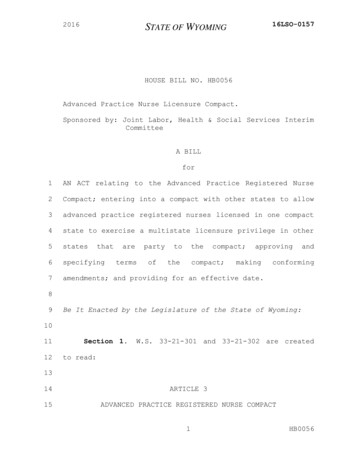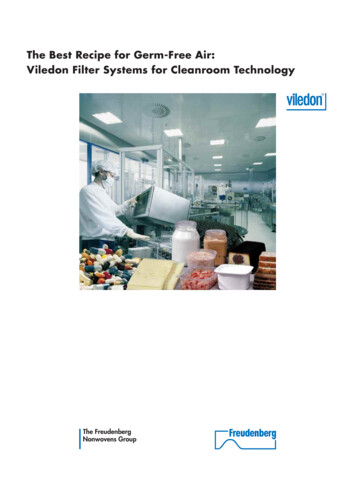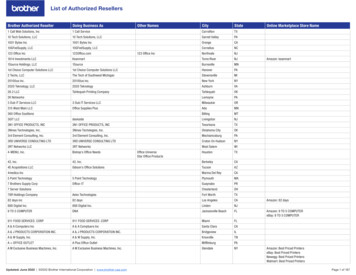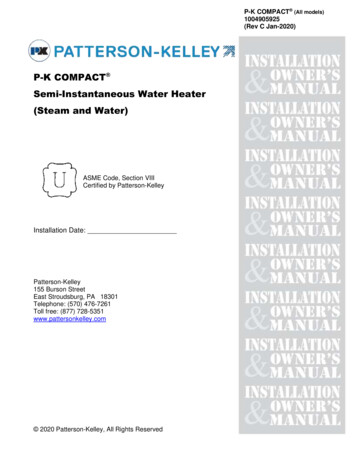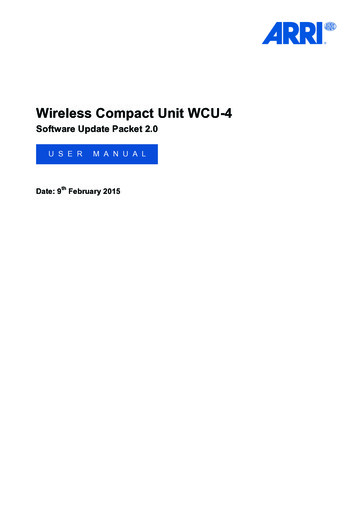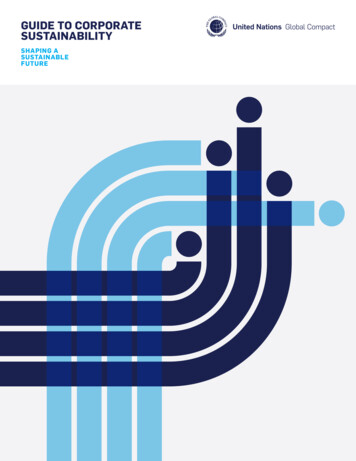
Transcription
GUIDE TO CORPORATESUSTAINABILITYSHAPING ASUSTAINABLEFUTURE
THE UNITED NATIONSGLOBAL COMPACTWORKS WITHBUSINESSES IN THEREALMS OF HUMANRIGHTS, LABOUR,ENVIRONMENT ANDANTI-CORRUPTION TOTRANSFORM OUR WORLD.WE’RE SHAPING ASUSTAINABLE FUTURE,AND YOU NEED TO BE APART OF IT.
U N I T E D N AT I O N S G L O B A L C O M PA C TWHAT IS CORPORATESUSTAINABILITY?A primer on the vede ning features ofcorporate sustainability06TABLE OFCONTENTS1PRINCIPLEDBUSINESSAligning withTen Principles on HumanRights, Labour, Environmentand Anti-Corruption102STRENGTHENINGSOCIETYTaking action andcollaborating withothers to advance globalchallenges284
G U I D E T O C O R P O R AT E S U S TA I N A B I L I T Y3LEADERSHIPCOMMITMENT4REPORTINGPROGRESSEffecting long-termchange begins with acompany’s leadershipTransparency inbusiness practice is crucialfor bilitythrougha local lensA look at who iscommitted to the GlobalCompact and where theyare located42465
PRINCIPLED BUSINESSSTRENGTHENING SOCIETYLEADERSHIP COMMITMENTREPORTING PROGRESSLOCAL ACTION5 THINGSSUSTAINABLECOMPANIESDO
G U I D E T O C O R P O R AT E S U S TA I N A B I L I T YWHAT ISCORPORATESUSTAINABILITY?Corporate sustainability is imperative for business today –essential to long-term corporate success and for ensuring thatmarkets deliver value across society. To be sustainable, companiesmust do ve things: Foremost, they must operate responsiblyin alignment with universal principles and take actions thatsupport the society around them. Then, to push sustainabilitydeep into the corporate DNA, companies must commit at thehighest level, report annually on their efforts, and engage locallywhere they have a presence.The connection between the bottomline and a company’s environmental,social and governance practices isbecoming clear. The well-being of workers, communities and the planet isinextricably tied to the health of thebusiness. The smart choice is to proactively manage a company’s operationsand value chain – looking at risks andopportunities through a wide lens.At the same time, our world’s challenges – ranging from climate, waterand food crises, to poverty, conflictand inequality – are in need of solutions that the private sector can helpto deliver. Businesses are responding,moving beyond their basic responsibilities and going further into astrategic opportunity space. This includes business models, products andservices with a joint societal and economic return; publicly advocating forgovernment policies that advancesustainability priorities; and, importantly, collaborating with peers to makesystemic changes.The Global Compact is the world’slargest global corporate sustainabilityinitiative, with over 8,000 companiesand 4,000 non-business participantsbased in over 160 countries. A vanguard of companies in all key marketsis taking action. Our participants represent nearly every industry sector andsize, and come equally from developedand developing countries. The ideaand practice of responsible business isrooted in all continents. We have over85 country networks that are convening companies to act on sustainabilityissues at the ground level.At the Global Compact we help companies, whether beginners on thesustainability journey or recognizedchampions, to meet their commitments to operate responsibly andsupport society. We do this through arange of activities at the internationaland local levels – from raising awareness and developing resources andbest practices, to facilitating partnerships and developing action initiativeson critical issues like climate, waterand women’s empowerment.7
U N I T E D N AT I O N S G L O B A L C O M PA C TBUSINESS PARTICIPANTS AROUND THE WORLDEUROPEL ATIN AMERICAASIA & OCEANIA4,3451,7121,267AFRICA & MENANORTHERN AMERICA82%600WHATCOMPANIESWANT FROMTHE GLOBALCOMPACT1 Good practiceexamples2 Tools & guidance3 Trainings8This guide lays out ve de ning featuresof corporatesustainability, whichthe Global Compactasks businesses tostrive towards –looking at why eachelement is essential,how business canmove forward andwhat the GlobalCompact is doingto help.364of companies attribute progress on their sustainability work to participating in the Global Compact1: PRINCIPLED BUSINESS2: STRENGTHENING SOCIETYFor any company seeking to be sustainable, it begins with operating withintegrity – respecting fundamentalresponsibilities in the areas of humanrights, labour, environment and anticorruption. The Global Compact’sTen Principles provide a universallanguage for corporate responsibility– understood and interpreted in 160countries around the world by over8,000 companies – and a framework toguide all businesses regardless of size,complexity or location.Sustainable companies look beyondtheir own walls and take actions tosupport the societies around them.Poverty, conflict, an uneducated workforce, and resource scarcity, for example, are also strategic issues for businesssuccess and viability. With businessactivity, investments and supply chainsreaching all corners of the earth,companies are choosing to be active stakeholders in societies for thelong run, knowing that they cannotthrive when the world around themis deteriorating.Respecting principles in businessoperations and supply chains is a baseline for corporate sustainability. Yet,principles are about far more thancompliance. They provide commonground for partners, a moral code foremployees, an accountability measurefor critics. A growing number of companies are seeing beyond risk, findingreal value in actively addressing social,environmental and governance issues.Companies are aligning core businessactivities, philanthropy and advocacycampaigns with UN goals and issues.Collaboration, in particular, is essential. Companies and stakeholders arecoming together to provide a collective voice and share risks in tacklingmajor challenges that no single playercan overcome, such as corruption, climate change and discrimination.
G U I D E T O C O R P O R AT E S U S TA I N A B I L I T YCORPORATESUSTAINABILITYIS A COMPANY’SDELIVERY OFLONG-TERMVALUE INFINANCIAL,ENVIRONMENTAL,SOCIAL ANDETHICAL TERMS.3: LEADERSHIP COMMITMENT4: REPORTING PROGRESS5: LOCAL ACTIONEffecting change begins with thecompany’s leadership. A public commitment by the chief executive, withsupport from the Board of Directors,is required to participate in the Global Compact. Leadership must send astrong signal throughout the organization that sustainability counts, andall responsibilities are important.Non-financial reporting expectationshave evolved from a feel-good supplement to a strategic report showingmeasurable gains and losses. As a chiefaccountability measure, signatoriesto the Global Compact are required toproduce an annual Communicationon Progress (COP), typically includedas part of their sustainability or annual report, providing the company’sstakeholders with an account of theirefforts to operate responsibly andsupport society. Over 28,000 COPs can befound on the Global Compact website.While the Global Compact principlesare universal, companies exist and actwithin nations and communities withhighly varying expectations of whatresponsible business means. Additionally, the types of issues a companyfaces and how it can actively supportlocal and national priorities rangesgreatly. To help business navigatesustainability on the ground, we haveGlobal Compact Local Networks in approximately 85 countries.This means instigating action in keyareas: Board ownership of the agenda;adjustments to policies and practices;alignment of government affairs;training and motivating employees;pushing sustainability into the supply chain; and disclosing efforts andoutcomes. Leaders also recognize theycannot shift systems alone, workingwith others to shatter barriers andincrease the odds of success. Sustainability requires a long-term vision andcommitment to ongoing efforts, bothto ensure progress and keep pace witha rapidly changing world.A number of stakeholders are drivingbusinesses to be more transparent– from investors and consumers, tocitizens and civil society groups. Atop priority is to find ways to bettermeasure sustainability impacts,which will help to direct effectivecorporate strategies, inform community and stakeholder dialogues,and guide investor decision-making.Our networks exist to support businessparticipants – large, small, foreignand local firms. They are organizedand run locally – led by business, butalways bringing key stakeholders tothe table from civil society, labour andacademia. Global Compact networksfoster learning, reporting, networking, partnerships and advocacy – allwith the goal of advancing sustainability understanding and performance country by country.TOP 3 REASONSWHY COMPANIESPARTICIPATEIN THE GLOBALCOMPACT79%Increase trust incompany throughcommitment tosustainability59%Universal nature ofthe principles56%Promotes action onsustainability withinthe company9
G U I D E T O C O R P O R AT E S U S TA I N A B I L I T Y1: PRINCIPLED BUSINESSTHEPOWER OFPRINCIPLESCorporate sustainability starts with a company’s value systemand a principled approach to doing business. This meansoperating in ways that, at a minimum, meet fundamentalresponsibilities in the areas of human rights, labour,environment and anti-corruption. Responsible businesses enactthe same values and principles wherever they have a presence,and know that good practices in one area do not offset harm inanother. By incorporating the Global Compact principles intostrategies, policies and procedures, and establishing a cultureof integrity, companies are not only upholding their basicresponsibilities to people and planet, but also setting the stagefor long-term success.THE TEN PRINCIPLES OF THE UNITED NATIONS GLOBAL COMPACTHuman RightsLabourEnvironmentAnti-Corruption1 Businesses should supportand respect the protection ofinternationally proclaimed humanrights; and3 Businesses should uphold thefreedom of association and theeffective recognition of the right tocollective bargaining;7 Businesses should supporta precautionary approach toenvironmental challenges;10 Businesses should work againstcorruption in all its forms, includingextortion and bribery.4 The elimination of all forms offorced and compulsory labour;8 Undertake initiatives topromote greater environmentalresponsibility; and2 Make sure that they are notcomplicit in human rights abuses.5 The effective abolition of childlabour; and6 The elimination of discriminationin respect of employment andoccupation.9 Encourage the development anddiffusion of environmentally friendlytechnologies.The UN Global Compact’s Ten Principlesare derived from: the Universal Declarationof Human Rights, the InternationalLabour Organization’s Declaration onFundamental Principles and Rights atWork, the Rio Declaration on Environmentand Development, and the United NationsConvention Against Corruption.11
BUSINESSINCREASINGLYTAKING ACTIONON HUMANRIGHTS(2009-2013)10%Increase in specificcorporate principleson human rights8%Increase in complaintmechanismsIncrease in operationalguidance notesRESOURCESSome Key Business& Human RightsGuidance MaterialsBusiness & HumanRights Learning ToolHuman RightsManagementFrameworkHuman Rights &Business DilemmasForumHow to Develop aHuman Rights PolicyGuide to HumanRights ImpactAssessment &ManagementHuman RightsReporting GuidanceBusiness ReferenceGuide to the UNDeclaration on theRights of IndigenousPeoplesHuman Rights &Labour WebinarSeriesPhoto: Jenny Matthews / Panos Pictures5%
G U I D E T O C O R P O R AT E S U S TA I N A B I L I T YHUMAN RIGHTSPRINCIPLES 1-2Respecting and supporting human rights remains one of the mostchallenging areas of corporate sustainability. Yet in an increasinglyinterconnected world with closer scrutiny of corporate impact onpeople and communities, more businesses are coming to realizetheir legal, moral and commercial need to do so within theiractivities and business relationships.Beyond the minimum responsibility to respect human rights,companies are also nding that voluntary actions which supportsocial development – such as creating diverse and inclusiveworkplaces, investing in communities and public policy advocacy,and engaging stakeholders – have business bene ts as well.The Global Compact brings clarity to this eld by demonstratingthe business case and emphasizing practical solutions. We helpcompanies navigate a range of challenges through resources,ranging from guidance documents, webinars and online forums,to special initiatives on the rights of groups – such as women,children, indigenous peoples and persons with disabilities.Working in close cooperation with the UN Of ce of the HighCommissioner for Human Rights and leaders in the field, and inalignment with the Guiding Principles on Business and HumanRights, we are putting forward approaches that are good forbusiness and for human rights.
Photo: Chris De Bode/Panos PicturesHumanRightsChecklistFollowing are the types ofpolicies and practices essentialfor rooting human rightsinto a company’s strategies,operations and culture.Data shown represents thepercentage of Global Compactcompanies that indicate takinga specific action.Specific human rights code35%Within overall corporate code72%Risk assessment21%Impact assessment14%Operational guidance notes24%Complaint mechanism39%Employee training &awareness44%Supply chain arrangements27%Employee performanceassessment36%Monitor & evaluateperformance31%Public disclosure of policies& practices29%Multi-stakeholder dialogue22%HOWWE AREHELPINGBUSINESSHumanRights andBusiness Dilemmas ForumImplementing humanrights principles canraise a number ofpractical dilemmas forbusiness. The HumanRights and BusinessDilemmas Forum helpscompanies tacklequestions related toapproximately 25 humanrights and businessthemes, such as migrantworkers, securityforces, gender equality,community relocation,product misuse andprivacy. The multistakeholder online forumis designed to stimulatediscussion, enhancecollective understandingof human rights themes,and identify practicalapproaches to realworld dilemmas. At theforum you can explorean expanding list ofhuman rights themeddilemmas that arerelevant to business,including explanation ofthe risks to business andsuggestions for how toapproach the dilemma.
Women’sEmpowermentPrinciplesGender equality is a fundamental and inviolablehuman right; it is alsoessential to expand economic growth, promotesocial development andenhance business performance. The Women’sEmpowerment Principles – Equality MeansBusiness initiative isengaging over 800 companies from all sectorsand regions to advancegender equality andwomen’s empowermentin the workplace, marketplace and community.A joint initiative withUN Women, the WEPsoutline seven steps toempower women andhighlight how full partic-Photo: Mark Henley/Panos PicturesChildren’sRights andBusinessPrinciplesipation by women in economic life is essential tobuild strong economies;establish more stableand just societies; improve quality of life alsofor men, families andcommunities; and propelbusiness objectives.Human rights apply toall children, and safeguarding these rightshelps build the strong,well-educated communities vital to creatinga stable and productivebusiness environment.The Children’s Rightsand Business Principlesidentify actions that allcompanies should taketo respect and supportchildren’s rights throughcore business, strategicsocial investments, advocacy, public policy andpartnerships. Suchaction can help companiesaddress risk management, build reputation,and enhance the sociallicense to operate. Developed in collaborationwith Save the Childrenand UNICEF, the CRBPscall on the businesscommunity to evaluateand take responsibilityfor their impact on thewell-being of children.15Photo: UNICEF/NYHQ2009-1240/Pirozzi
%Increase inmechanisms for ageverification8%Increase in monitoring& evaluation ofperformance †Increase in vocationaltraining & counselingRESOURCESGuide to the LabourPrinciples of the UNGlobal CompactEliminating ChildLabour – Guides forEmployersChild LabourMonitoringResource KitE-Learning Tool onHuman TraffickingHuman Trafficking& BusinessCombating ForcedLabourDisability in theWorkplaceAddressing theRetention of IdentityDocumentsOccupational Safety& Health in theSupply ChainPhoto: Manoocher Deghati / IRIN6%
G U I D E T O C O R P O R AT E S U S TA I N A B I L I T YLABOURPRINCIPLES 3-6Decent working conditions, including those that protect thesafety and health of workers, are far from assured in today’s globalbusiness community. The illicit use of child labour and forcedlabour remains a risk as global supply chains extend to distantregions. Hazardous workplaces continue to exist, particularly in themining, manufacturing and construction industries.Companies everywhere need to look deeper into their ownoperations and value chain to uphold labour standards. Bypromoting decent work and inclusive employment opportunities,business also plays a role in advancing societal priorities, includingby partnering with workers to improve industrial relations andbuilding more resilient economies and communities.The Global Compact’s labour principles are championed by theInternational Labour Organization (ILO). A range of guidance exists,especially related to child labour, forced labour and discrimination.The Global Compact focuses on disseminating these resourcesamong business participants and supporting related projects.Additionally, because labour issues have important cross-cuttingimplications, much work also falls under our human rights andsupply chain portfolios.
LabourChecklistFollowing are the types ofpolicies and practices essentialfor rooting labour standardsinto a company’s strategies,operations and culture.Data shown represents thepercentage of Global Compactcompanies that indicate takinga specific action.Right to organize81%Collective bargaining43%No forced labour64%No child labour67%Non-discrimination85%Equal opportunity79%Risk assessment35%Impact assessment23%Photo: Nyani Quarmyne/Panos PicturesSafe working conditions82%Mechanisms for ageverification43%Employee training &awareness59%Supply chain arrangements28%Monitor & evaluateperformance53%Public disclosure of policies& practices41%Multi-stakeholder dialogue26%HOWWE AREHELPINGBUSINESS ChildLabourPlatformThe Child LabourPlatform is a multisector, multi-stakeholderforum for sharingexperiences andlessons learned ineliminating child labour,particularly in the supplychain. The Platformdelivers training andcapacity support toaddress obstaclesand key dilemmasfaced by business,links with globaland local initiativesagainst child labour,and fosters practicalaction that can make adifference in affectedcommunities. Co-chairedby the InternationalTrade UnionConfederation (ITUC)and the InternationalOrganisation ofEmployers (IOE), andcoordinated by the ILOand the Global Compact,companies and relevantorganizations areencouraged to join theChild Labour Platform.
ILOHelpdesk forBusinessThe ILO Helpdesk forBusiness is a free serviceto assist companymanagers and workerson how to better alignbusiness operationswith international labourstandards. The Helpdesk offers individualassistance – providedconfidentially by emailor over the phone – fromlabour experts at theILO. The Global Compactpromotes the Helpdeskto business participantsas a resource for improving their understandingof the labour principlesand other labour topics.Photo: Kieran Dodds/Panos PicturesWebinarSeriesPhoto: Stefan Boness/Panos PicturesThe Global Compacthosts a Webinar Serieson specific labourtopics. Each webinaris conducted by ILOexperts and engagesbusiness participantswith practical guidanceand relevant tools andresources for advancingthe labour principles.Several cross-cuttingtopics have explored theworkplace dimensions ofhuman rights includinggender equality andwomen’s empowerment,indigenous peoples’rights, children’s rightsand the rights of personswith disabilities.19
COMPANIESCOMINGCLEAN ONENVIRONMENT(2009-2013)8%Increase in publicdisclosure of policiesand practices6%Increase in reportingof emissions andstrategic climate dataIncrease in settingconsumption andresponsible tegyAction Hubs:Climate, Energy& WaterBusiness andClimate ChangeAdaptationGuides forResponsibleCorporateEngagement onClimate & WaterPolicyRespecting theHuman Right toWater & SanitationCorporate WaterAccountingGuide to WaterRelated CollectiveActionScaling Up GlobalFood Securityand SustainableAgricultureFramework forCorporate Actionon Biodiversity andEcosystemsPhoto: Nyani Quarmyne / Panos Pictures6%
G U I D E T O C O R P O R AT E S U S TA I N A B I L I T YENVIRONMENTPRINCIPLES 7-9The world today is facing unprecedented, interconnectedenvironmental challenges in areas including climate change,water, energy, biodiversity and agriculture. With business relyingon natural resources directly and via supply chains, new corporateefforts are needed to address environmental responsibilities,value natural capital, and better understand the linkagesbetween resources.To prepare for this increasingly challenging landscape, theGlobal Compact’s Environmental Stewardship Strategy is designedto help companies develop a holistic and comprehensive strategy. Itrecognizes the growing linkages among various environmental issuesas well as their connections to social and development priorities.The Global Compact pushes companies to move beyond traditionalapproaches based largely on compliance and narrow riskassessments. We ask business to actively address environmentalrisks and opportunities, and have major efforts underway withbusiness in the areas of climate, water and food. As a result, weare seeing businesses around the world preparing for a moresustainable future and becoming part of the solution.
EnvironmentChecklistFollowing are the types ofpolicies and practicesessential for rootingenvironmental stewardshipinto a company’s strategies,operations and culture.Data shown represents thepercentage of Global Compactcompanies that indicate takinga specific action.Management systems65%Technology assessment44%Life-cycle assessment/costing29%Water footprintingHOWWE AREHELPINGBUSINESS34%Risk & impact assessment50%Performance targets/indicators64%Cleaner & safer production61%Consumption & responsibleuse targets66%3R (reduce, re-use, recycle)60%Employee training &awareness62%Supply chain arrangements31%Monitor & evaluateperformance53%Report emissions38%Public disclosure of policies& practices49%Multi-stakeholder dialogue26%Caring forClimateBusinesses are seeingclimate change notas a stand-aloneenvironmental issue,but rather as a globalcross-cutting challengeto which they need toadapt in order to remainprofitable. Caring forClimate is the world’slargest business andclimate initiative,providing a frameworkto implement practicalsolutions and help shapepublic policy.Nearly 400 companiesfrom 60 countries havesigned on to Caringfor Climate – led bythe Global Compact,UN EnvironmentProgramme (UNEP)and the secretariatof the UN FrameworkConvention on ClimateChange (UNFCCC). Chiefexecutives who endorsethe initiative agree toset goals, develop andexpand strategies andpractices, and publiclydisclose emissions.Also companies committo advocate for aglobal climate changeagreement in global andlocal policy discussions.Setting a price on carbonthat reflects the toll thatfossil fuels are taking onthe planet is a key stepto limit greenhouse gasemissions and get aheadof the climate changecurve. Our BusinessLeadership Criteriaon Carbon Pricingchallenges companiesto integrate carbonpricing into corporatelong-term strategiesand investmentdecisions, advocatefor carbon pricing, andcommunicate progress.
Photo: Tim Dirven/Panos PicturesCEOWaterMandateAdvancing waterstewardship to addressshared risks is essential. The CEO WaterMandate brings togethercompanies, both leadersand learners, interestedin addressing the globalwater crisis. Endorsedby approximately 130companies, the CEOWater Mandate assistscompanies in the development, implementationand disclosure of watersustainability policiesand practices.The Mandate helpscompanies to share bestand emerging practicesand to forge partnerships addressing accessto water and sanitation.The initiative’s tools andresources help companies tackle water-relatedbusiness risks, communicate their policies andpractices to stakeholders, and contributeto the sustainablemanagement of sharedfreshwater resources.Food AgricultureBusinessPrinciplesAs the world’s population grows to nine billionby 2050 and demandon global food systemsintensifies, business willbe a critical partner indesigning and deliveringeffective, scalable andpractical solutions forfood security and sustainable agriculture.To advance the positiveimpact of business inthis space and enableprinciple-based partnerships, the GlobalCompact facilitated thedevelopment of the Food Agriculture BusinessPrinciples, the first setof global voluntarybusiness principles forthe food and agriculturesector. The FAB Principles reflect common,fundamental elementsof existing voluntarystandards and technicalcompliance platforms inthe industry, and coverissues ranging from foodsecurity, health andnutrition, to humanrights, good governance,and environmentalstewardship, as well asensuring economic viability across the entirevalue chain.The principles offer abasis for all responsiblebusinesses – regardlessof size, crop or location– to collaborate with theUN, governments, civilsociety and others todeliver global foodsecurity solutions andalign their operationswith sustainable development goals.23Photo: Georg Gerster/Panos Pictures
RISING BUSINESSTIDE AGAINSTCORRUPTION(2009-2013)14%Increase in policiesrelated to corruption11%Increase inzero-tolerance policy13%RESOURCESBusiness AgainstCorruption: AFramework forActionThe Fight AgainstCorruptionE-Learning ToolAnti-CorruptionTools InventoryGuidance on AntiCorruption RiskAssessmentReporting Guidanceon the 10th Principleagainst CorruptionResisting Extortion& Solicitationin InternationalTransactionsPractical Guideto Help PreventCorruption in theSupply ChainFighting Corruptionin Sport Sponsorship& Sport RelatedHospitalityAnti-CorruptionCollective ActionHubPhoto: Stuart Freedman / Panos PicturesIncrease inanti-corruptionmanagement systems
G U I D E T O C O R P O R AT E S U S TA I N A B I L I T YANTI-CORRUPTIONPRINCIPLE 10Corruption has considerable impacts on business: impedinggrowth, escalating costs and posing serious legal and reputationalrisks. It is also a major hindrance to advancing societies, witha disproportionate impact on poor communities. Corruptionraises transaction costs, undermines fair competition, distortsdevelopment priorities, and impedes long-term foreign anddomestic investment.New and tougher anti-corruption regulations continue to emergeworldwide, prompting companies to focus on measures to protecttheir reputations and the interests of their shareholders. Investorsare acknowledging that corruption can negatively impact valueand pose nancial, operational and reputational risks to theirinvestments. All companies need robust anti-corruption measuresand practices as part of their corporate sustainability strategy.The Global Compact and our partners are working to helpcompanies on a range of anti-corruption issues, including riskassessment, reporting and supply chain practices. Additionally,we are mobilizing business to provide a united voice againstcorruption, as collective action is essential for bringing an end to asystemic issue that is too complex for any company to tackle alone.
RiskAssessmentAnti-CorruptionChecklistAssessing risks is acrucial step to implementcorporate sustainabilitysuccessfully, decrease theexposure to various risksand avoid costly damages.Good compliance startswith a comprehensiveunderstanding of acompany’s corruptionrisks. The GuidanceFollowing are the types ofpolicies and practices essentialfor rooting anti-corruptioninto a company’s strategies,operations and culture.Data shown represents thepercentage of Global Compactcompanies that indicate takinga specific action.on Anti-Corruption RiskAssessment providespractical steps on how tocomplete an assessment:establish the process,identify the risks, rate therisks, identify mitigatingcontrols, calculateremaining residual risk anddevelop an action plan.Within overall corporate code71%Zero-tolerance policy54%Management systems47%Specialized unit32%HOWWE AREHELPINGBUSINESSRisk assessment27%Impact assessment15%Policy is publicly accessible45%Anonymous hotline forreporting corruption32%Sanction system forbreaches35%PublicReporting46%Public reporting sendsa strong signal toemployees, investorsand consumers thata company is seriousabout its commitmentto transparency andresponsible businesspractices. TheReporting Guidanceon the 10th Principleagainst Corruptionequips business witha practical means toreport on anti-corruptionpolicies and actionscomprehensively andeffectively. It includes aEmployee training &awarenessSupply chain arrangements28%Record instances ofcorruption31%Monitor & evaluateperformance30%Public disclosure of policies& practices32%Multi-stakeholder dialogue16%broad set of reportingelements and is rootedin existing practice,including indicatorsof initiatives such asPACI, FTSE4Good,TransparencyInternational, the GlobalReporting Initiativeand the InternationalCorporate GovernanceNetwork. To helpcompanies of all sizesand at all stages, thematrix provides guidancefor reporters on a basicand a desired level.Photo: Mark Henley/Panos Pictures
SupplyChainBusinesses all over theworld are exposed dailyto corruption risks inthe supply chain, andincreasingly recognizethe associated costs andrisks – including reputational, financial and,under some legislation,Photos: ABOVE Philippe Lissac/Godong/Panos Pictures BOTTO
GUIDE TO CORPORATE SUSTAINABILITY. 5 THINGS SUST AINABLE COMP ANIE S DO PRINCIPLED BUSINESS STRENGTHENING SOCIETY LEADERSHIP COMMITMENT REPORTING PROGRESS LOCAL ACTION. 7 . network-ing, partnerships and advocacy - all with the goal of advancing sustain ability understanding and perfor-mance country by country. CORPORATE SUSTAINABILITY IS A .
